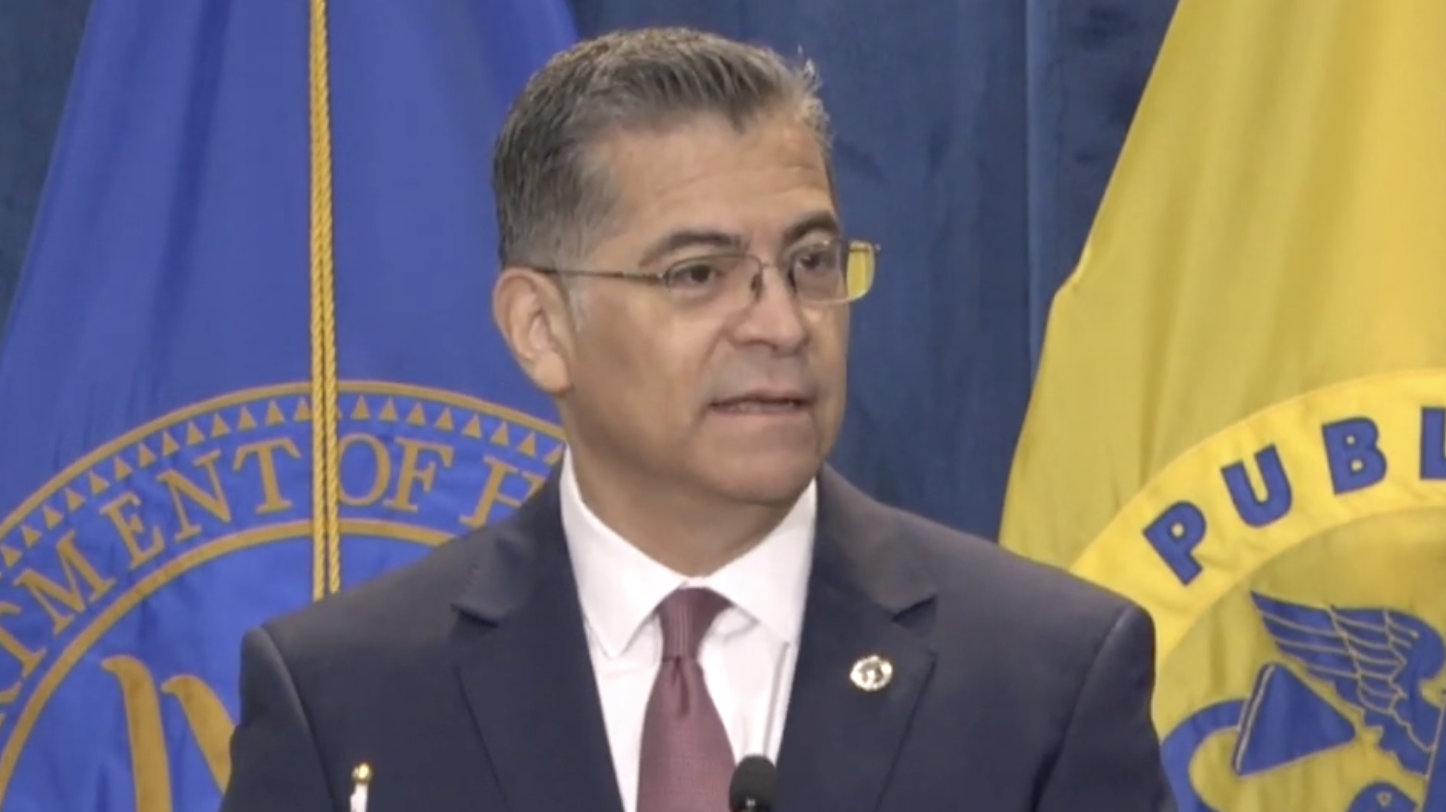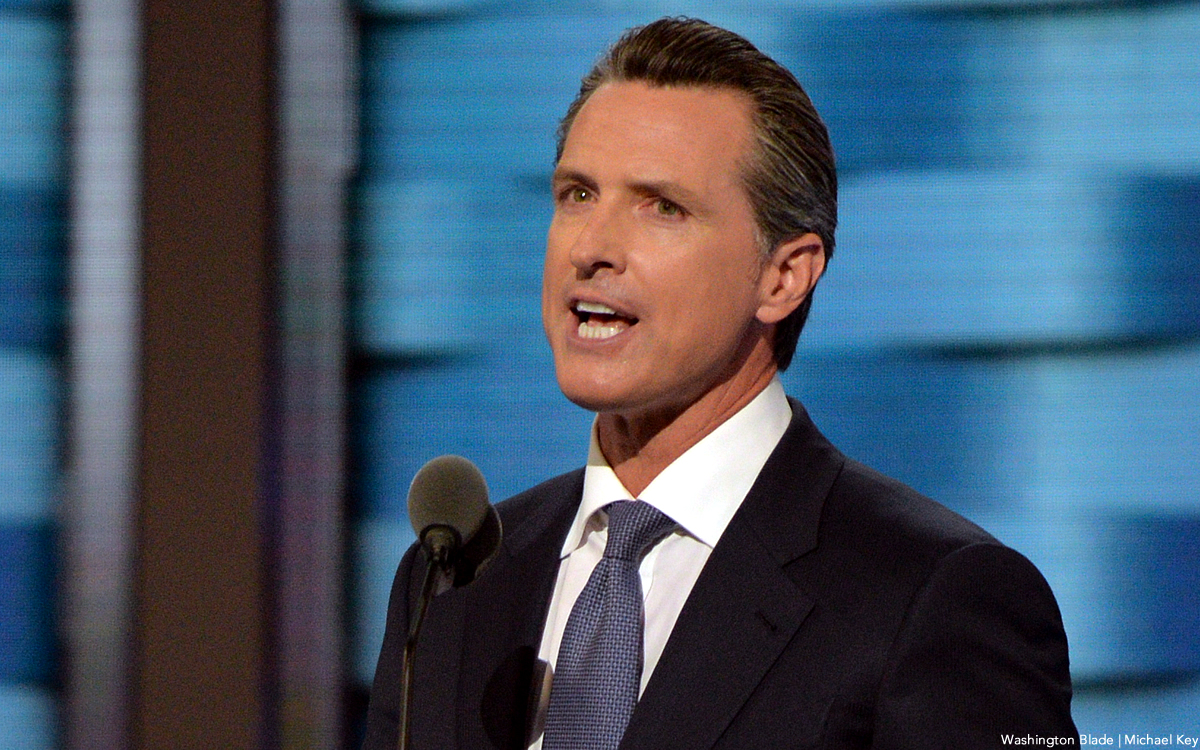Federal Government
Xavier Becerra and Karine Jean-Pierre headline HHS Pride summit
Secretary said ‘Supporting the LGBTQI+ community is a top priority’

The U.S. Department of Health and Human Services held a Pride Summit on Monday that featured appearances by HHS Secretary Xavier Becerra and White House Press Secretary Karine Jean-Pierre.
Each delivering remarks about the administration’s commitment to continuing its work fighting for LGBTQ Americans, they were joined at the event by other top officials from the Biden-Administration and other U.S. federal agencies including Assistant Secretary for Health Admiral Dr. Rachel Levine, White House Deputy National Mpox Coordinator Dr. Demetre Daskalakis, and Harold Phillips, director of the White House’s Office of National AIDS Policy.
“Supporting the LGBTQI+ community is a top priority for me and HHS,” said Becerra, who noted the agency’s work to facilitate greater access to gender-affirming healthcare and on issues of health equity and access for the LGBTQ community more broadly.
“We are facing daunting challenges right now – with some politicians spewing hateful rhetoric and imposing restrictions against the LGBTQI+ community,” the secretary said. However, “thanks to the leadership of President Biden, I am confident we will make it through this moment.”
Especially right now, when the United States participates in international fora and urges other countries around the world to unequivocally support women’s rights and “have protections for the LGBTQI+ community,” the strength of those calls are compromised by America’s failures to live up to those commitments at home, Becerra said.
Therefore, he said, it is insufficient to merely protect the rights and freedoms currently in place: “We’re here because this game of defense can get tiring. We want offense.”
Taking the stage after Becerra, Jean-Pierre began her remarks by telling the audience, “As the first openly queer person to hold the position of press secretary, I have learned a lot this year.” (She also holds the distinction of being the first Black person ever to serve in the role.)
“One thing I can say for sure being in my position is that representation matters,” she said. “It matters at the White House podium. It matters in agencies like HHS. It matters who is sitting at the table making incredibly important policy decisions as we have seen through these last two years of this administration, especially as it relates to our community.”
Despite this progress, Jean-Pierre said, “It’s been a scary year. A very difficult year” in which “over a dozen states have enacted anti-LGBTQ+ laws that violate our most basic values and freedoms as Americans,” policies that are “careless,” and “callous to our kids, our neighbors, and those in our community.”
The press secretary listed some of the Biden-Harris administration’s accomplishments in advancing rights and protections for LGBTQ Americans as well as plans to continue that work in the face of major challenges facing the community, including from these harmful policies coming from state legislatures.
For example, she highlighted the White House’s announcement earlier this month of new actions to better protect LGBTQ youth and the community’s physical safety. She noted these measures come in response to challenges ranging from the homelessness and mental health crises afflicting young LGBTQ people in America to the escalation of bias-motivated acts of violence.
Also in attendance at Monday’s Summit were leaders from LGBTQ advocacy organizations including Human Rights Campaign President Kelley Robinson and National Center for Lesbian Rights Executive Director Imani Rupert-Gordon.
HHS issued a press release following the event in which the agency listed forthcoming actions on a variety of matters concerning health access and equity for the LGBTQ community: a Behavioral Health Care Advisory on Transgender and Gender Diverse Youth, which will serve as a resource for mental health providers; guidance for state child welfare agencies clarifying directives for them to support LGBTQ youth in their care, including by facilitating access to gender affirming medical treatments; advising providers of their right to deny requests for private patient information, including that which concerns these types of clinical care; and notice of proposed rulemaking that will codify legal protections under the Affordable Care Act for trans people in healthcare and health insurance coverage.
Additionally, on Tuesday, HHS debuted its FindSupport.Gov webpage, which features resources to help LGBTQ people find “inclusive and affirming mental health care and support,” including for problems with drugs and alcohol, along with guidance on how to avoid and deal with “harmful approaches like ‘conversion therapy.’”
This year, HHS kicked off Pride Month with a flag raising ceremony on June 1, which was followed by a string of appearances by Becerra at LGBTQ celebrations across the country, which included events focused on mental health and gender affirming care — as well as the D.C. Pride parade, where the secretary marched with Levine and other HHS appointees and their families.
“I have crossed the country,” Becerra said during his remarks on Monday. “I have met with trans teens to find out how we can serve them better. We have met with folks who have been attacked during Pride months. We have met with those who are seeing their children denied the gender affirming care that they need. And we know that those are our families. Those are our kids. Those are our teems in school. And so we’re gonna do everything we can.”
“When we raised the flag earlier this month, it was interesting that in such a short order of time, I was no longer able to say we are the first and only agency who has claimed that flag at the very top of this building,” he said. “It was great to see that we were joined by essentially the U.S. Federal Government, the Biden administration.”
Federal Government
White House finds Calif. violated Title IX by allowing trans athletes in school sports
Education Department threatens ‘imminent enforcement action’

The Trump-Vance administration announced on Wednesday that California’s Interscholastic Federation and Department of Education violated federal Title IX rules for allowing transgender girls to compete in school sports.
In a press release, the U.S. Department of Education’s Office of Civil Rights threatened “imminent enforcement action” including “referral to the U.S. Department of Justice” and the withholding of federal education funding for the state if the parties do not “agree to change these unlawful practices within 10 days.”
The agency specified that to come into compliance; California must enforce a ban excluding transgender student athletes and reclaim any titles, records, and awards they had won.
Federal investigations of the California Interscholastic Federation and the state’s Department of Education were begun in February and April, respectively. The Justice Department sued Maine in April for allowing trans athletes to compete and refusing a similar proposal to certify compliance within 10 days.
Broadly, the Trump-Vance administration’s position is that girls who are made to compete against trans opponents or alongside trans teammates are unfairly disadvantaged, robbed of opportunities like athletics scholarships, and faced with increased risk of injury — constituting actionable claims of unlawful sex discrimination under Title IX.
This marks a major departure from how the previous administration enforced the law. For example, the Department of Education issued new Title IX guidelines in April 2024 that instructed schools and educational institutions covered by the statute to not enforce categorical bans against trans athletes, instead allowing for limited restrictions on eligibility if necessary to ensure fairness or safety at the high school or college level.
Sports aside, under former President Joe Biden the department’s Office of Civil Rights sought to protect against anti-LGBTQ discrimination in education, bringing investigations and enforcement actions in cases where school officials might, for example, require trans students to use restrooms and facilities consistent with their birth sex or fail to respond to peer harassment over their gender identity.
Much of the legal reasoning behind the Biden-Harris administration’s positions extended from the 2020 U.S. Supreme Court case Bostock v. Clayton County, which found that sex-based discrimination includes that which is based on sexual orientation or gender identity under Title VII rules covering employment practices.
A number of high profile Democrats, including California Gov. Gavin Newsom, have recently questioned or challenged the party’s position on transgender athletes, as noted in a statement by Education Secretary Linda McMahon included in Wednesday’s announcement.
“Although Gov. Gavin Newsom admitted months ago it was ‘deeply unfair’ to allow men to compete in women’s sports, both the California Department of Education and the California Interscholastic Federation continued as recently as a few weeks ago to allow men to steal female athletes’ well-deserved accolades and to subject them to the indignity of unfair and unsafe competitions.”
Federal Government
Trump’s dismantling of US foreign aid derails HIV prevention effort in Africa
FDA approved breakthrough preventative drug lenacapavir earlier this month

On June 18, the Food and Drug Administration approved a long-acting injectable for the prevention of HIV that could have a transformational impact on decades-long efforts to end the epidemic in the U.S. and abroad.
Offering robust protection with just two doses per year, lenacapavir has the potential to dramatically improve uptake and adherence compared to daily oral PrEP regimens like Truvada or Descovy, particularly for high risk populations living in places with poor health infrastructure or where stigma about HIV discourages frequent testing and clinic visits.
According to the New York Times, however, the rollout of lenacapavir for HIV prevention overseas has been stymied by the gutting of agencies, staff, programs, and funding dedicated to foreign aid and public health during President Donald Trump’s second term.
Among other moves, the administration has frozen or withdrawn nearly all U.S. foreign development assistance, dismantled the U.S. Agency for International Development and reduced the size of its workforce by more than 95 percent, and shuttered key public health units housed under the U.S. Department of Health and Human Services, the National Institutes of Health, the Centers for Disease Control and Prevention, and the FDA.
As a result, the Times reports, HIV programs across the African continent have been “scrambling to procure drugs that the United States once supplied, replace lost nurses and lab technicians, and restart shuttered programs to prevent new infections.”
Experts fear HIV infection rates are climbing in some of the hardest-hit countries, but since the U.S. pulled funding for data collection and monitoring, there is no way to know for sure.
Historically, the U.S. has provided about 75 percent of all global spending on efforts to fight the epidemic, a reflection of the extent to which there was broad bipartisan support for the allocation of resources for this purpose through programs like the President’s Emergency Plan for AIDS Relief. Trump continued this legacy in his first term, launching the ambitious Ending the HIV Epidemic initiative that was continued under former President Joe Biden.
After returning to the White House, however, the president and his administration have justified their slash-and-burn cuts to the federal government’s work in international development and public health by arguing that funds and resources sent to overseas nations are too often pilfered by corrupt foreign state actors or wasted on ineffectual programs.
Trump and his allies also believe the U.S. should no longer be expected to shoulder such a disproportionate share of the responsibility for foreign aid, and that other countries are likelier to step up and contribute more in response to America’s retreat.
Federal Government
So far, virtually no acknowledgement of Pride month by federal gov’t
Trump-Vance administration proclaimed ‘no more drag shows’ at Kennedy Center

Just a few days from the start of June, there has been virtually no acknowledgment of Pride month by federal government agencies this year, a striking departure from recent policy and practice under the Biden-Harris administration and even under President Donald Trump’s first term.
Some limited and more localized observances have been preserved or renewed in 2025, for example by the U.S. courts’ webpage celebrating history-making LGBTQ jurists like Judges Deborah A. Batts and J. Paul Oetken of the U.S. District Court for the Southern District of New York, and by the Metropolitan Washington Airports Authority, which notes on its website plans to actively participate in WorldPride 2025.
The paltriness of Pride this year comes pursuant to several policy changes under Trump 2.0 such as executive orders narrowing the definition of gender to exclude trans and nonbinary people and banning activities related to diversity, equity, and inclusion, which have led to agency-wide changes including the removal of LGBTQ focused website content and dissolution of “affinity groups.”
Many of these actions came to light in the first few months of Trump’s second term. For example, in January the Associated Press reported a memo from the U.S. Defense Intelligence Agency indicating that observances related to Martin Luther King Jr. Day, Pride Month, Holocaust Days of Remembrance, and other cultural or historical annual events would be paused.
While it remains to be seen whether and to what extent the White House, federal government, and Congress will acknowledge Pride month in 2025, in 2024:
- • At the end of May, President Joe Biden issued a proclamation declaring June LGBTQ Pride Month, as he had done for the previous three years of his administration
- • The U.S. Senate, then under Democratic control, introduced a resolution recognizing June 2024 as LGBTQ Pride Month
- • Federal agencies across the whole of government participated in Pride activities, and at a high level — for instance, then-U.S. Secretary of State Antony Blinken hosted a Pride month convening focused on U.S. foreign policy, national security, inclusive development, and human rights
- • Actions in June, which in many cases were coordinated via LGBTQ employee resource groups or affinity groups, included celebrations of LGBTQ individuals — for example, the U.S. Department of Commerce’s Economic Development Administration toasted those who made significant contributions to economic growth, while the U.S. Patent and Trademark Office hosted a “Proud Innovation 2024” event, highlighting the accomplishments of LGBTQ innovators, entrepreneurs, and small business owners who utilize intellectual property to grow their businesses and mentor others in their communities.
- Agencies also provided support indirectly — for example, the U.S. Federal Trade Commission sponsored attorneys who wished to represent the FTC at LGBTQ Pride events organized by various bar associations
The Washington Post pointed to some of the challenges facing organizers of WorldPride as they plan festivities in D.C. throughout early June: “This year, the LGBTQ+ celebration is being held in the backyard of a government that has targeted transgender rights and made major cuts to HIV prevention programs. At the Kennedy Center, President Donald Trump has promised “NO MORE DRAG SHOWS, OR OTHER ANTI-AMERICAN PROPAGANDA.”
On June 14, Trump is set to preside over a military parade in Washington commemorating the 250th anniversary of the U.S. Army, his 79th birthday, and Flag Day, in a celebration that will feature 6,600 soldiers from at least 11 corps and divisions nationwide and 150 military vehicles, including 28 M1 Abrams tanks.
-

 U.S. Supreme Court3 days ago
U.S. Supreme Court3 days agoSupreme Court upholds ACA rule that makes PrEP, other preventative care free
-

 U.S. Supreme Court3 days ago
U.S. Supreme Court3 days agoSupreme Court rules parents must have option to opt children out of LGBTQ-specific lessons
-

 India5 days ago
India5 days agoIndian court rules a transgender woman is a woman
-

 National4 days ago
National4 days agoEvan Wolfson on the 10-year legacy of marriage equality









